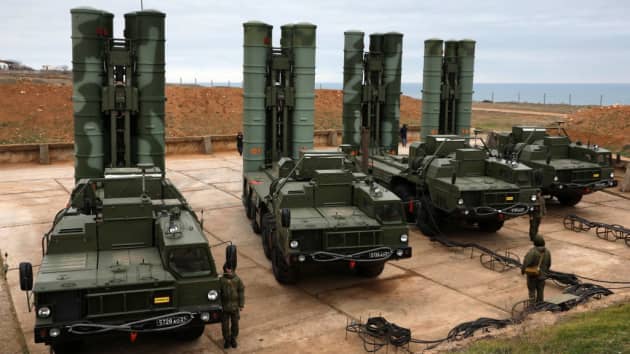 A Russian S-400 surface-to-air missile system (File photo)
A Russian S-400 surface-to-air missile system (File photo)
The announcement on December 14 by the US Secretary of State Mike Pompeo of sanctions against Turkey under the provisions of the Countering America’s Adversaries Through Sanctions Act (CAATSA) comes as a surprise, since President Donald Trump’s affection for Turkish leader Recep Erdogan is fairly well-known. And Trump had shielded Turkey from sanctions all along.
Pompeo said in the statement that Turkey has been “knowingly engaging in a significant transaction with Rosoboronexport, Russia’s main arms export entity, by procuring the S-400 surface-to-air missile system.” But isn’t that old news? As to what prompted Pompeo to take such a decision in the waning days of the Trump presidency, he or the state department officials couldn’t explain with conviction.
According to the Fact Sheet of the state department, the sanctions include: i) prohibition on granting US export licenses and authorisations for any goods or technology transferred to Turkey’s Presidency of Defense Industries (SSB); ii) prohibition of US loans or credits exceeding $10 million to SSB; iii) ban on US Export-Import Bank assistance for exports to SSB; iv) US opposition to loans to SSB by international financial institutions; and, v) freezing the bank accounts and importing visa restrictions on SSB’s head and 3 top officials.
Curiously, these sanctions do not have any ‘bite’, so to speak. And the US officials have been openly apologetic while briefing the media. The assistant secretary for international security and non-proliferation Christopher Ford said, “We very much regret this (sanctions) has been necessary and we very much hope that Turkey will work with us to resolve the S-400 problem as quickly as possible.”
He acknowledged, “our purpose, of course, has not been to upend the relationship with such a close ally. We are trying to send a strong signal and to make SSB clearly feel the consequences.” Ford waffled. Another state department official, deputy assistant secretary for European affairs Matthew Palmer explained that “it’s a complex relationship. It’s a challenging relationship. It’s a relationship of consequence. Of course Turkey is still a partner and a NATO ally… We’re ready to talk to Turkey about the path forward.” Ford gave another spin, saying, “we are where we are … with having to follow the provisions that Congress put in place as part of US law.”
But Ankara has reacted swiftly. A Foreign Ministry statement in Ankara condemned the US decision and rejected it as “completely senseless.” It warned, “Turkey will take the necessary steps against this decision, which will negatively affect our relations and will retaliate in a manner and timing it deems appropriate.”
The statement urged Washington “to reconsider this unfair decision… and to rectify this grave mistake as soon as possible.” The Turkish presidency called the US decision “unreasonable, fruitless, and ultimately incompatible with the spirit of our partnership” and saw the hidden hand of “anti-Turkish lobbies” in the Beltway. It also expressed the hope that Washington “will reverse this grave mistake without delay.”
Uncharacteristically enough, President Erdogan has been reticent even 24 hours after the announcement in Washington. But Defence Minister Hulusi Akar told the state news agency Anadolu on Tuesday, “We condemn this decision, which does not comply with alliance, current military, or political realities. This sanction decision has shaken all values of alliance between our countries.”
Highlighting the air and missile threats that Turkey faces, Akar said the country is taking all measures to protect itself and its people. He added, “Obviously, sanctions on a NATO member country will not only undermine the spirit of the alliance, but will deeply undermine trust among allies.”
As Turks would see it, this US move bears the imprimatur of Pompeo, a devout evangelist, who never cared to hide his visceral dislike of Turkey, which he once described, in the wake of the failed coup attempt against Erdogan in July 2016, as a country only “as democratic as Iran” and as a “totalitarian Islamist dictatorship.”
Pompeo never once paid an official visit to Ankara as state secretary. He even left Turkey out of his regional tour in the fall which took him to Greece and Cyprus. Finally, Pompeo drew some vicarious pleasure in subbing Erdogan by undertaking a private tour of Istanbul with his wife on November 17, and disrespectfully suggesting to Foreign Minister Mevlut Çavuşoğlu that they could meet if the latter would go to Istanbul to see him.
Conceivably, much of this bruised ego and the ensuing antipathy toward Erdogan should be traced to Pompeo’s term as the head of the House Intelligence Committee of the Congress at the time of the July 2016 coup attempt in which the American agencies apparently had played a key role.
According to various accounts, Pompeo had canvassed strongly for the job as CIA chief in 2017 in the new administration, although as a Tea Party activist, he was opposed to Trump’s candidacy. Conceivably, Pompeo’s public act of putting Erdogan on the mat will please the US intelligence establishment.
Equally, slamming sanctions against Turkey when only days are left for Pompeo to relinquish office suits his future personal political agenda, apart from kickstarting yet another foreign policy crisis in the Middle East for the incoming Joe Biden Administration whose priority has been the re-launch of talks with Iran. By the way, Biden and Erdogan go back a long way.
Having said that, the geopolitical impact of the future trajectory of the Turkish-American relationship consequent upon the US sanctions should not be minimised. Turkey is a major player in the regions surrounding it and, make no mistake, what is at stake is the independent foreign policy course Erdogan has been chartering in the recent years.
